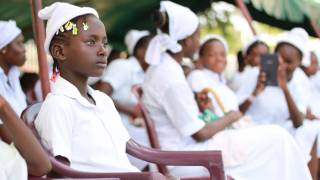Cervical Cancer Becoming Rare in the UK

After decades of research, the United Kingdom (UK) launched a human papillomavirus (HPV) vaccine program for teenage girls in 2008.
A new study published by The Lancet on November 3, 2021, shows the HPV vaccine dramatically reduces cervical cancer rates by almost 90% in women in their 20s who were offered the vaccine beginning at age 12.
These researchers estimated that the HPV vaccination program prevented around 450 cervical cancers and about 17,200 cases of precancerous conditions over an 11 year period. The research team looked at all cervical cancers diagnosed in England in women aged 20 to 64 between January 2006 and June 2019.
The HPV vaccine is most effective when given between the ages of 11 and 13 when someone is less likely to have been exposed to HPV.
“It’s a historic moment to see the first study showing that the HPV vaccine has and will continue to protect thousands of women from developing cervical cancer,” stated Michelle Mitchell, Cancer Research UK’s chief executive, in a related press statement.
“Cancer Research UK has been funding research in this area for many years, and we’ve been eagerly awaiting these results since the introduction of the vaccination program.”
“Around 850 women die from cervical cancer each year in the UK, so we have the chance to save many lives.”
Almost all cervical cancers are caused by HPV – a link proved more than 20 years ago by Cancer Research UK scientists, overturning previous studies that had underestimated the link.
The HPV vaccine protects against the main cancer-causing strains of the virus: HPV 16 and 18. Protecting people against the infection helps to prevent abnormal changes in cervical cells, leading to fewer cases of cervical cancer.
But as the vaccine was only introduced in the 2000s, it hasn’t been possible until recently to say the vaccine reduces cases of cervical cancer itself – the ultimate goal of the vaccination program.
This study, based at King’s College London and the UK Health Security Agency (UKHSA), and the National Cancer Registration and Analysis Service (NCRAS), is the first of its kind to focus on the UK vaccination program.
And the first-ever to analyze the effectiveness of the bivalent cervical cancer vaccine (Ceravix).
The vaccine reduced cervical cancer incidence by 34% in those who received it aged 16 to 18, by 62% if aged 14 to 16, and by 90% in those who were vaccinated aged 12 to 13.
Professor Peter Sasieni, the lead author from King’s College London, says: “It’s been incredible to see the impact of HPV vaccination, and now we can prove it prevented hundreds of women from developing cancer in England.”
“We’ve known for many years that HPV vaccination is very effective in preventing particular strains of the virus, but to see the real-life impact of the vaccine has been truly rewarding.”
“Assuming most people continue to get the HPV vaccine and go for screening, cervical cancer will become a rare disease.”
“These data show that vaccination works in preventing some cancers.”
The HPV virus is also linked to vaginal, vulval, anal, penile, and some head and neck cancers.
Dr. Vanessa Saliba, a Consultant Epidemiologist for UKHSA, said: “These remarkable findings confirm that the HPV vaccine saves lives by dramatically reducing cervical cancer rates among women.”
“This reminds us that vaccines are one of the most important tools we have to help us live longer, healthier lives.”
There are different types of HPV vaccines authorized globally.
PrecisionVaccinations publishes fact-check-research-based vaccine news.
Our Trust Standards: Medical Advisory Committee
























